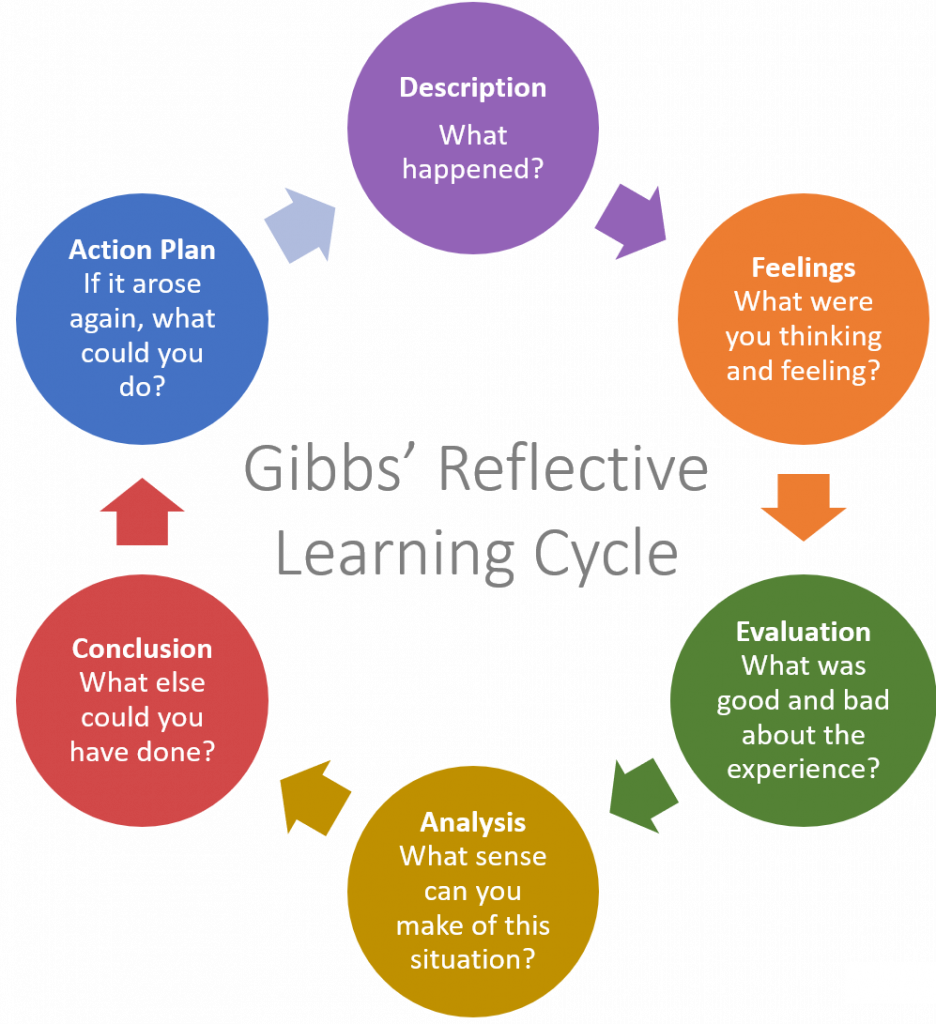Do you want the real answer or the answer I have been preparing for weeks?
That question runs through my mind in every interview. It’s like a performance, I turn into a different character and pretend that everything is fine. This façade emerges through rigorous coaching, research, and a lot of coffee. Of course, I would never make this known to the interviewers. To them I am a calm and intellectual teacher in waiting who knows everything about the Northern Ireland Music curriculum.
I have always wanted to be a teacher, but I didn’t know which pathway to take. Primary? Post-primary? Peripatetic? Through my placement in the Music department of Banbridge Academy I realised that I belonged in secondary education, so I decided to base my simulated interview on secondary PGCE Music. I will employ Gibb’s reflective cycle to examine my experience.

“Hello, I am your interviewer”
So, what happened? The initial part of an interview lies within the dreaded waiting area. This is the time when your heartrate is high, and you suddenly forget everything you prepared. After what felt like a lifetime, I was met by one of the three interviewers who brought me into the room. Once greetings were exchanged the ten-minute interview began. I was asked five questions which focused on qualities which would make me a good teacher, knowledge of the curriculum and behavioural management.
The interviewers took notes of my responses and concluded with the classic, “Do you have any questions?” Being eager to impress I asked how school placements were acquired. A panellist answered that a PGCE student must select three grammar and three high schools, and that the university will contact the schools. I thought this was a very informative response to my question.

Anxious Anecdote
Interviews conjure an array of negative feelings. The most common emotion is “job interview anxiety experienced by many candidates” (Feiler, Powell, 2016). The worst part of my interview was the moments before it began. This was when my anxiety was at its peak where the ‘what if’ questions crept into my mind making me doubt my knowledge.
According to Feiler and Powell they advise that “interviewees may want to focus on how assertive and interpersonally warm they appear” (2016). I did this by reciting positive affirmations in my head allowing me to be more confident. Of course, unexpected questions can give you a fresh shot of adrenaline. For me it was question five on behavioural management which caught me off guard. I had not prepared for this question, so this was challenging. However, I composed myself (pardon the pun) and answered to my best ability, giving examples of a time I had to control classroom behaviour on placement.
The good, the bad and everything in-between
Overall, I was happy with the outcome of my interview. I felt that I answered the questions well, which reflected in the feedback I received from the interviewers.
“Good content”
“Well prepared”
“Confident body language”
I was pleased to read these comments on my feedback form with 4/5 ratings for my content, reflection, and presentation. I was also praised for dressing like a teacher. I had discovered in the lecture on interview skills that you should dress for the job you want. Of course, I am only human, so perfection is a mere impossibility. When discussing my feedback with the panellists some negatives emerged such as my answer to question five on behavioural issues. Asking about the context of the issue, such as whether it was a practical or theory lesson, would have allowed me to be more specific about strategies to control difficult behaviour.

Delving Deeper
PGCE courses are extremely competitive and receive many applicants so you must stand out at your interview. “If you go into an interview half-hearted, it will show” (Sewell, 2008, p.92). That is why I put so much preparation into this simulated interview giving me an advantage over other applicants. Over preparation ultimately is the key to success.
In addition to acquired knowledge I also employed the STAR technique which helped organise my thoughts and answer questions in a more detailed manner.

Despite answering the questions well, I did not get 5/5 rating due to not being assertive or confident enough. I really needed to convince the interviewers that everything I said was fact and not be afraid to sell myself. I find this quite uncomfortable to do but realise that a hint of arrogance is sometimes required. As a potential PGCE student, “the ability to demonstrate mastery of the topic is therefore crucial to success” (Butroyd et al., 2008, p.96).
Looking Back
I have learnt that interview anxiety will never be eradicated, however, I do believe that the more I put myself under the pressures of an interview then the more confident I will become. This coincides with being well prepared for whatever questions I may face. Through this process I discovered gaps in my knowledge and areas requiring further preparation such as behavioural management.
Receiving and responding to interviewer feedback is difficult to accept but also vital for self-improvement. Helping me to identify behaviours to be enhanced, such as my assertiveness, took place as a result of critical responses from others.

The Real Thing
Going forward I will continue to ‘over prepare’ for interviews as this gives me confidence when answering questions. I plan to continue the use of simulated interviews with friends and family to help reduce anxiety and identify any areas that need further improvement. As my confidence grows, I will hopefully become more adept at demonstrating my skills and knowledge. I plan to investigate the more niche areas of education including behavioural management so I can give a clear response when asked.
I also hope to meet with teachers and PGCE students who have ‘been there and done that’ so that I can gain an insight into potential questions and topics to focus on. This preparation should ensure that I am ready for whatever I may face in forthcoming interviews.

Bibliography:
Butroyd, R. et al. (2008) Master’s Level Study in Education: A Guide to Success for PGCE Students. McGraw-Hill Education, England.
Feiler, A.R., Powell, D.M (2016) ‘Behavioural Expression of Job Interview Anxiety’, Journal of Business and Psychology, 31, pp. 155-171.
Gibbs, G (1988) Learning by Doing: A guide to teaching and learning methods. Oxford Brookes University. Available at https://thoughtsmostlyaboutlearning.files.wordpress.com/2015/12/learning-by-doing-graham-gibbs.pdf(Accessed 7/02/2023).
Sewell, K (2008) Doing your PGCE at M-Level: A guide for students. SAGE Publications Ltd, London.
You May Also Like

To Be Or Not To Be – That Is The Interview Question
23 February 2023
Job Interviews: Selling Yourself For A Pay Cheque
24 February 2023
